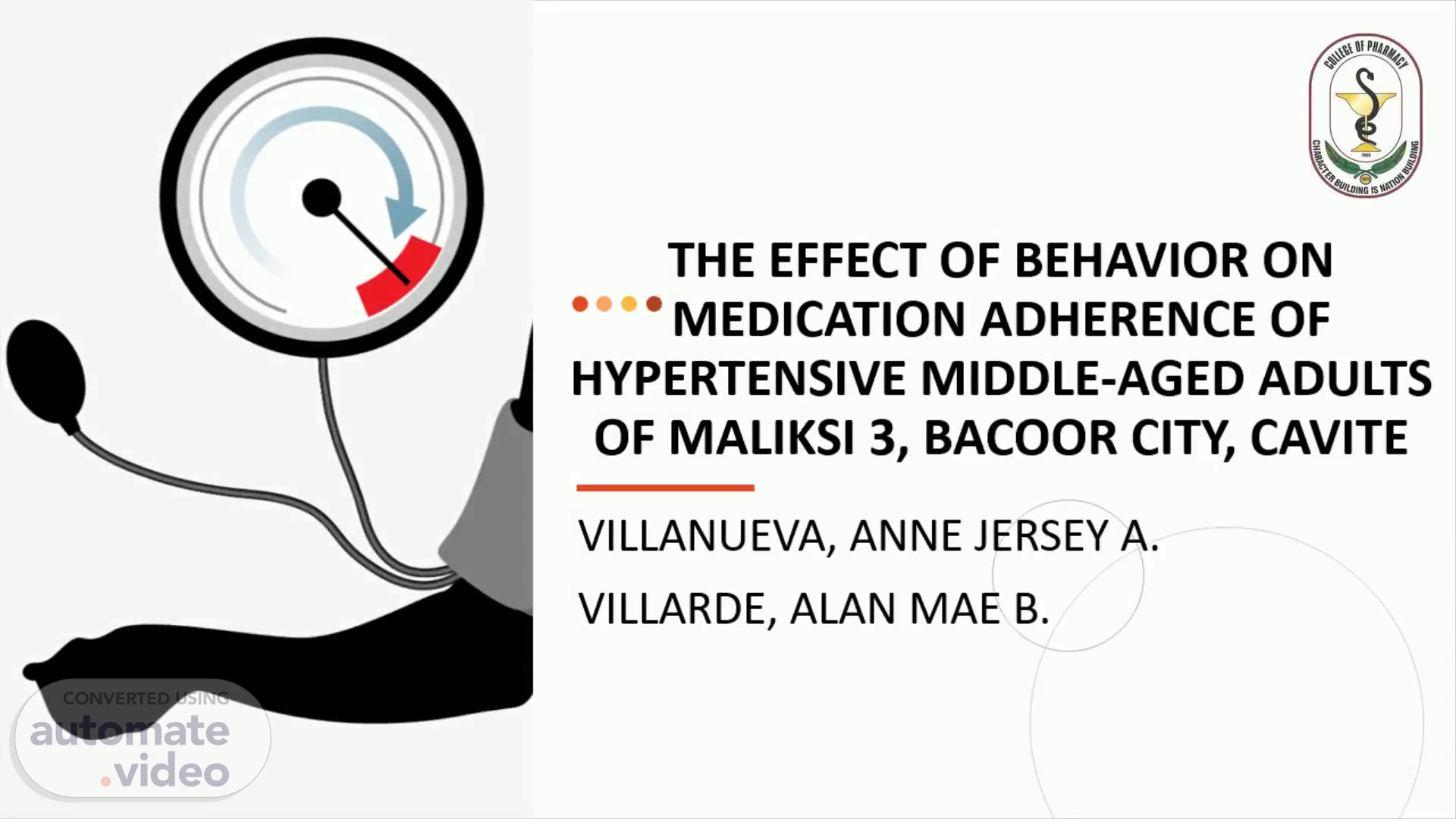
THE EFFECT OF BEHAVIOR ON MEDICATION ADHERENCE OF HYPERTENSIVE MIDDLE-AGED ADULTS OF MALIKSI 3, BACOOR CITY, CAVITE
Scene 1 (0s)
THE EFFECT OF BEHAVIOR ON MEDICATION ADHERENCE OF HYPERTENSIVE MIDDLE-AGED ADULTS OF MALIKSI 3, BACOOR CITY, CAVITE.
Scene 2 (12s)
Background of the Study. The primary variables of the HBM, or constructs that can predict various health-promoting behaviors, have been successfully used to solve multiple public health issues . Other diseases in patients with hypertension such as dyslipidemia, obesity, and diabetes mellitus were associated with the patient's medication adherence..
Scene 3 (33s)
Background of the Study. Adherence to antihypertensive therapy is a significant predictor of blood pressure response to medication. Several trials have been conducted over the last two decades to assess drug adherence. According to studies, patients' most common barriers are forgetting to take their medications. They tend to take their medicines with varying schedules because they think they may lack social support at their homes..
Scene 4 (54s)
REVIEW OF RELATED LITERATURE. Singh et al. (2017) and Arellano et al. (2019) both stated that there is a risk of hypertension to older individuals which is contributed to their medical background and family histories. Michie et al. (2018) and Ma (2017) mentioned that health-related behaviors associated with hypertension like engaging in non-pharmacological treatment may improve medication adherence..
Scene 5 (1m 13s)
REVIEW OF RELATED LITERATURE. Gutierrez et al. (2020) mentioned that education involvement can increase awareness and knowledge which leads to improving medication adherence and blood pressure control among individuals with hypertension..
Scene 6 (1m 26s)
conceptual FRAMEWORK. THE EFFECT OF BEHAVIOR ON MEDICATION ADHERENCE OF HYPERTENSIVE MIDDLE-AGED ADULTS OF MALIKSI 3, BACOOR CITY, CAVITE.
Scene 7 (1m 33s)
conceptual FRAMEWORK. The framework of this study is anchored on the Health Belief Model by Huang. The health belief model (HBM) is a methodology for researching health behaviors. HBM stresses demographic, social, structural, and personal variables in which external variables are those that may have an impact on the study's findings (Bhandari, 2021)..
Scene 8 (1m 50s)
STATEMENT OF THE PROBLEM. 1. What is the demographic profile of the respondents in terms of: 1.1 Age; 1.2 Gender; 1.3 Marital Status; 1.4 Educational Background; and 1.5 Employment Status? 2. What are the behaviors of hypertensive middle-aged adults towards medication based on the Health Belief Model?.
Scene 9 (2m 10s)
STATEMENT OF THE PROBLEM. 3. What is the level of medication adherence of hypertensive middle-aged adults using the Morisky Medications Adherence Scale (MMAS-4)? 4. Is there a significant relationship between the behaviors of hypertensive middle-aged adults towards medication and their level of medication adherence?.
Scene 10 (2m 26s)
HYPOTHESIS. Ho: There is no significant relationship between the behaviors of hypertensive middle-aged adults towards medication and their level of medication adherence ..
Scene 11 (2m 37s)
METHODOLOGY. Research Design: Quantitative design Inclusion and Exclusion Criteria The inclusion criteria include participants who are between the age of 36 to 55 years old and are being treated for hypertension and are residents of Maliksi 3, Bacoor City, Cavite..
Scene 12 (2m 52s)
METHODOLOGY. Sampling Procedures Purposive sampling Research Instrument Survey questionnaire. Data Analysis frequency count, percentage or relative frequency, and the chi-square test..
Scene 13 (3m 4s)
METHODOLOGY. Respondents. THE EFFECT OF BEHAVIOR ON MEDICATION ADHERENCE OF HYPERTENSIVE MIDDLE-AGED ADULTS OF MALIKSI 3, BACOOR CITY, CAVITE.
Scene 14 (3m 11s)
SUMMARY of findings. Demographic profile Majority of the respondents are above 49 years old, females, married, college graduates and are employed. Health Belief Model Majority of the respondents believe that hypertension can be a serious disease if they do not control it and that it would be worse if they did nothing about it..
Scene 15 (3m 29s)
SUMMARY of findings. Level of Medication Adherence The level of medication adherence of hypertensive middle-aged adult-respondents is “Poor” in which they forget to take their medicines, they stop taking their medicines when they feel worse and they are careless at times in taking their medicines..
Scene 16 (3m 45s)
CONCLUSIONS. THE EFFECT OF BEHAVIOR ON MEDICATION ADHERENCE OF HYPERTENSIVE MIDDLE-AGED ADULTS OF MALIKSI 3, BACOOR CITY, CAVITE.
Scene 17 (4m 6s)
CONCLUSIONS. THE EFFECT OF BEHAVIOR ON MEDICATION ADHERENCE OF HYPERTENSIVE MIDDLE-AGED ADULTS OF MALIKSI 3, BACOOR CITY, CAVITE.
Scene 18 (4m 24s)
RECOMMENDATIONS & SUGGESTIONS. The staff of the community health center should launch an information campaign for the re-education of hypertensive middle-aged adults on the different preventive measures for them to prevent having more complicated health conditions. Pharmacy students should likewise make a part of their community immersion the education of community members of the importance of taking medications according to the advice of medical doctors..
Scene 19 (4m 44s)
RECOMMENDATIONS & SUGGESTIONS. 3. It will be recommended by researchers to hypertensive middle-aged adults that without disrespect to their personal beliefs, they should give priority to their wellness and health if they genuinely want to live longer and be with their loved ones for a long time. 4. It will be recommended that the members of the healthcare team to convince the hypertensive middle-aged adults of the importance of adhering to medications which can save their life more than their beliefs that are sometimes held out of personal prejudices..
Scene 20 (5m 9s)
RECOMMENDATIONS & SUGGESTIONS. 5. To the future researchers in the medical field, especially the pharmacy students, the researcher will be recommending that they also be able to grasp important information about the behaviors of hypertensive middle-aged adults..